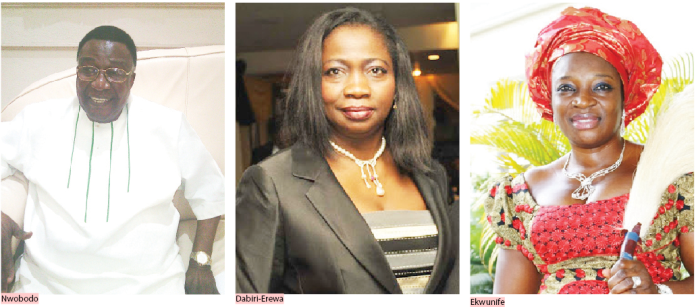Assistant Politics Editor, DANIEL KANU, takes a critical look at the recent defection by Peoples Democratic Party (PDP) members to the All Progressives Congress (APC), submitting that it has been the spanner in the works of democracy in the country.
Since the victory of the All Progressives Congress (APC)’s Muhammadu Buhari over then incumbent President Goodluck Jonathan of the Peoples Democratic Party (PDP) in the March 28, 2015 Presidential election, the nation has been witnessing gale of defections to the new ruling party.
For the typical Nigerian politician, it is traditional that if his party loses election, it is time to abandon it for the winning party.
In Nigeria, since 1999, losing parties always shirk the responsibility of playing the role of opposition, and many opposition party members have had to defect to the ruling party to be able to have a share of power.
The triumph of the APC is believed in many political quarters as symbolic, despite that the result Nigerians get does not seem cheering any longer. The symbolism was hinged on the fact that it was the first time a sitting President was defeated by the opposition and the verdict was obeyed by the incumbent, thereby handing over to an opposition party without a fight. Of course, that singular action elevated the rating of Jonathan in public prism.
The argument has been that the opportunistic disposition of many opposition party stalwarts seemed to have made it impossible for the opposition parties to stand up to the PDP domination. So the development was historic.
Political observers have continued to contend that the activities of political parties in the country over the years have become a poisonous cocktail of opportunism and defections.
This, they claim, contributed to the democratic deficit the country suffers today, as efforts to deepen democracy crumbled.
Arguably, since the return to democratic rule in 1999, the PDP had bestridden Nigeria’s political landscape like a colossus. In fact, the PDP was generally recognised as the largest political party in Africa. The party was seen as the platform of choice because the mentality on the ground was “if you can’t beat them, join them”.
What perhaps seems to be a trend for most Nigerian politicians is dumping their party after electoral loss. They rather see it as political wisdom.
Most politicians in the country do not seem to be comfortable outside the corridors of power, for reasons best known to them.
Against the backdrop, the opportunism that characterised the opposition when the PDP held sway seems to still be the order of the day. What has changed is that there has been a reversal of roles with the PDP now being the less preferred platform.
It is believed that the opportunistic attitude of politicians is made worse by the zero sum nature of politics in the country.
The dilemma and frustration of opposition political parties, political watchers opine, are borne out of the winner-takes-all setting of Nigerian politics where opposition is an island of frustration and anger, and being left out can lead to desperation.
It has been argued that the state has increasingly become a magnet for all facets of political and economic life. In the light of this reality about the state, there is a desire among politicians in the country to capture the state and its apparatus. This desire to capture the state is because the state is seen as the major means of production.
Capturing the state and having access to it opens the doors to other societal privileges. This explains the intensity and persistence in the struggle to capture and control the offices of the state and to defect to the ruling party, to continue to be politically-relevant.
Down memory lane
TheNiche research has shown that defections in the country’s politics predate even the country’s Independence.
According to Mike Ozekhome, “In Nigeria, nine years before Independence, that is in 1951, several members of the now defunct National Council of Nigeria and the Cameroons (NCNC) played a political gimmick by decamping overnight to the old Action Group (AG) for the purpose of denying NCNC the majority in the Western Region House of Assembly.”
After Independence, this trend continued. It is on record that in the First Republic, many politicians defected to the ruling party. For example, of the 75 members of parliament elected on the platform of AG in 1959, only 13 remained in 1961. The same scenario played out in the Second Republic with many opposition politicians defecting to the then ruling National Party of Party (NPN) with Shehu Shagari as the President.
However, in the Fourth Republic defection and the underlying opportunism assumed the status of a norm. There are situations where some politicians that have good political foresight leave the party before their failure in the election.
It is on record that at a time, perhaps fearing that the PDP would be trounced at the polls, some of the party’s senators, not less than 12 in one day, including the present Senate President Olusola Saraki, defected to the APC.
The list
In less than two weeks after the March 28 Presidential election and even before the April 11 governorship poll, the defections had already been kick-started. For instance, Wednesday, April 8, 2015 was not a good day for the PDP. The then ruling party suffered the loss of several heavyweights from its fold, who mass-defected to the APC.
In Adamawa State, the immediate past political adviser to Jonathan, Ahmed Gulak, who initiated the Jonathan re-election campaign, led the pack of defectors. Jumping ship alongside Gulak were two serving senators, Ahmed Hassan Barata (Adamawa South) and Mohammed Bello Tukur (Adamawa Central); former Deputy Senate Leader, Senator Jonathan Zwingina; and former Minister of Health, Dr. Idi Hong; among several others.
From the South East, former governor of old Anambra State, Jim Nwobodo; and former member of the House of Representatives, Uche Ekwunife, who later represented Anambra Central at the Senate before her election was annulled by the Court of Appeal, defected to the ruling APC.
In Ondo State, PDP’s immediate past national legal adviser, Olusola Oke, and his two wives joined the APC along with a member of the House of Representatives representing Okitipupa/Irele and former commissioners under the late Olusegun Agagu administration. Princess Oladunni Odu, Ayo Ifayefunmi, Olajide Ajana, former Senator Gbenga Ogunniya and Mrs. Febi Adeyemi followed suit.
Former Head of Service, Alaba Isijola, and former member of the House of Representatives, Abayomi Sheba, were also among the defectors.
Similarly in Oyo State, PDP lost key members which included a member of the House of Representatives, Afeez Jimoh; a former member of the House of Representatives, Folake Olunloyo-Osinowo; PDP governorship aspirant, Mrs. Ayoka Lawani; Waheed Adeleke, Tayo Sarumi, Dr. Azeez Adeduntan and other party leaders.
In Dutse, Jigawa State, more than 370,000 members of the PDP members defected to the APC on Sunday, December 20, 2015. John Odigie-Oyegun, the party’s national chairman, received the defectors with not less than six governors in attendance. The governors included Bindo Jibrila (Adamawa), Abubakar Bello (Niger), Atiku Bagudu (Kebbi) and Aminu Bello Masari (Katsina).
Others were Muhammed Abubakar (Bauchi), Kasim Shettima (Borno), Abdulazeez Yari (Zamfara) and Hafiz Abubakar, deputy governor of Kano State.
APC members react
Most members of the APC have expressed divergent views over the unrestrained manner of PDP defectors to their party. While some say the defectors should not be tolerated, some are of the view that the APC system will frustrate them since the reality would dawn on them that it is not business as usual.
For instance, after due consideration of character, loyalty, perseverance and consistency as a progressive, a five-member screening committee set up by the APC first disqualified a former member of the House of Representatives, Ekwunife, from contesting election into the vacant seat of the Anambra Central Senatorial District.
Chairman of the panel, Osita Okechukwu, said part of the reason was the deep concern of her record “which showed that she dumps political parties at will, leaving the parties in its wake factionalised – from the PDP to All Progressives Grand Alliance (APGA), to Progressive Peoples Alliance (PPA), back to PDP or vice versa and now to APC. She is more or less a fair-weather hen; therefore her antecedent contravenes Section 4(3) of the 2014 Guideline for Nomination of Candidate for Public Office. Caution is valour.”
It took a higher body that Ekwunife appealed to, to rescind the decision, perhaps due to her electoral value in the area.
Some critics say APC, given its loud mouthed philosophy, ought to have disqualified Ekwunife, if what it preaches is what it sticks to in reality.
A commentator from Anambra, who preferred anonymity, told TheNiche: “APC with that singular action has compromised its philosophy and you can see that it allowed a person that joined the party in less than a month to run with its ticket just, because the members feel she has electoral value that can make them win the election. But Victor Umeh will give them a shock of their lives because Anambra people now know the APC trick.”
Former Chairman, House of Representatives Committee on the Diaspora, Abike Dabiri-Erewa, frowned at the gale of defections of politicians from the PDP to her party, the APC.
Dabiri-Erewa who expressed her disgust over the gale of cross-carpeting, described it as shameful, calling the defectors “political prostitutes”.
In a series of tweets via her Twitter handle, @abikedabiri, the ex-lawmaker, who represented Ikorodu Federal Constituency, Lagos State, however, said: “The rate of defection from PDP to APC is shameful. Political prostitutes, politics of convenience, not conviction.”
For her, the APC should not allow the defections. “But APC leadership thinks otherwise,” she added.
She pointed out that defection should not be so easy. “But hopefully, we will gravitate towards ideology.”
Dabiri-Erewa, however, added that “I will keep airing my minority views on this.”
Legal expert and rights activist, Tunji Abayomi, told TheNiche that there was nothing to fear about, as the APC would provide adequate framework to control members’ behaviour in the party.
“You don’t need to stop them; but when they come, they will abide by a new governance ideology,” he noted. “When people move from one place to another, they live according to the philosophy of that place. If you leave House A, and you come to House B, in House B you may find out you have to wake up early in the morning, say 6am, to sweep the floor.
“May be in House A, you just sweep the floor only once a week. So I believe that PDP’s coming is good, but it is not going to change anything. They will have to live by the philosophy of the objectives and ideals of the APC.
“It is when they fail to do that, that we can complain. But largely, I don’t even believe the problem is with regard to PDP or APC; it is with regard to the personality and the character, the values and ideals of leaders whether they are in PDP or APC or in any other party.
“There are people in the PDP that stand for something, just as there are people in APC that don’t stand for anything. But I think it is important to have leaders who have sufficient personality character and commitment to high values.”
APC chieftain, Tony Momoh, has warned that defectors coming into the party to avoid investigation and prosecution by security and anti-corruption agencies are only wasting their time because they will be exposed.













